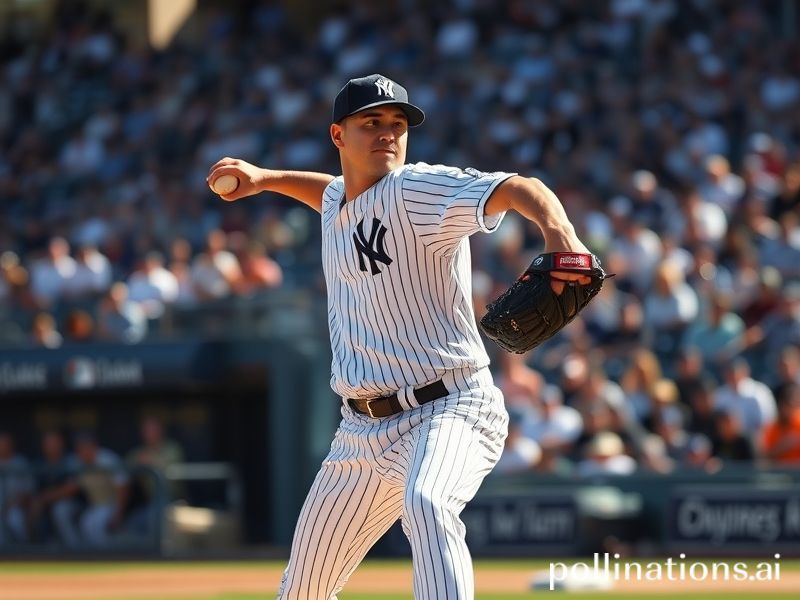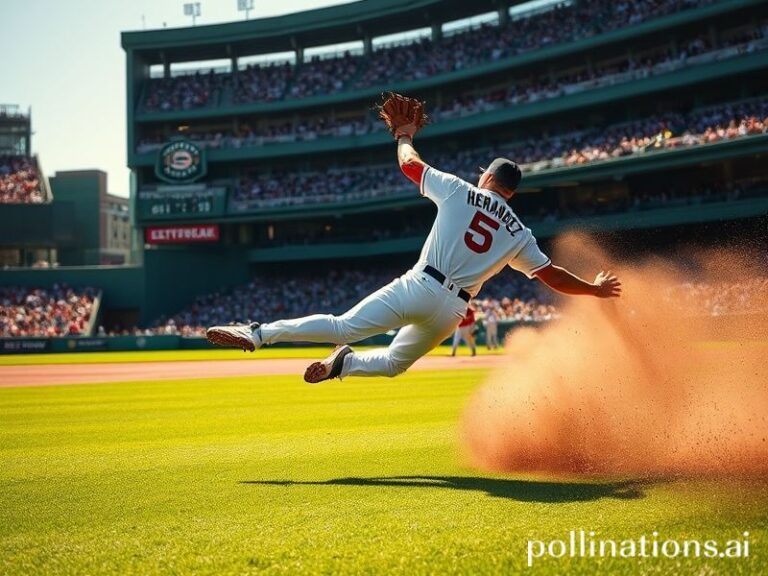Carlos Rodón: The $162 Million Lefty Pitching America’s Soft-Power Fastball to a Sleepless World
Carlos Rodón, the Enigma Who Reminds Us the World Is Still Watching Baseball
by Dave’s Locker International Desk
Somewhere between the 14-hour bullet train from Tokyo to Osaka and the overnight cargo flight that sneaks MLB highlight reels into European sports bars at 3 a.m., Carlos Rodón is throwing 97-mph aspirin tablets past grown men who grew up dreaming of the Champions League. This, in itself, is a geopolitical miracle: a left-handed North Carolinian whose slider breaks so sharply it could qualify for its own Schengen visa now dictates bedtime schedules from Seoul to Seville.
Let’s zoom out. While G-7 finance ministers argue over who forgot to bring the printer paper, Rodón is the Yankees’ $162 million argument that the United States still exports something other than inflation and unsolicited military advice. Every time he spins a no-hitter, foreign exchange desks in Singapore briefly forget the yen exists. Not because Singaporean analysts care about baseball—most still think a “double play” is a K-pop marketing tactic—but because U.S. sports rights are denominated in dollars, and dollars remain the planet’s reserve currency of distraction.
Rodón’s 2021 no-hitter for the White Sox was streamed live in 122 countries, according to MLB’s suspiciously round press release. That means at least one Estonian insomniac saw the final out at 5:47 a.m. Tallinn time and thought, “Well, at least something is perfect today,” before remembering his government had just collapsed. Such is baseball’s soft-power payload: a fleeting, nine-inning antidepressant for the international news cycle.
Of course, Rodón’s career arc reads like a Greek tragedy co-written by Kafka and an orthopedist. Drafted third overall in 2014, he arrived with the fanfare of a North Korean missile test—minus the accuracy. Tommy John surgery, shoulder fatigue, and a personality best described as “pleasantly monosyllabic” kept his stardom stuck in bureaucratic customs. Then, suddenly, 2021: 24.1 consecutive hitless innings, a slider that violated at least three Hague Conventions, and a walk rate lower than global trust in Facebook.
The Yankees pounced, offering enough money to refloat the Argentine peso. Rodón responded by immediately straining his forearm, because the baseball gods enjoy irony almost as much as they enjoy ligament tears. Now, entering 2024, he is the highest-paid question mark since the last Davos communique: Is he ace, injury magnet, or a living metaphor for late-capitalist over-leverage?
Overseas, the implications ripple. Japanese baseball academies—already exporting pitching robots that bow politely—study Rodón’s hip rotation like it’s the Dead Sea Scrolls of biomechanics. Korean conglomerates, bored of merely owning the battery supply chain, now scout American lefties as aggressively as they once scouted lithium deposits. Meanwhile, the European Union, suddenly terrified its citizens might discover an actual sport, quietly funds cricket outreach programs in primary schools.
Back home, Rodón’s Dominican-born catcher, Jose Treviño, provides daily Spanish-English interpretations of mound conversations that essentially boil down to, “Try not to throw your arm into another time zone.” Their bilingual tango is a reminder that America’s pastime is now a hemispheric joint venture, complete with tariff disputes over rosin bags.
And so, every fifth day, Carlos Rodón steps onto a diamond carved from Ohio clay, watched by satellites, algorithms, and that one guy in Lagos streaming on 2G who just wants to see something break besides his national grid. Win or lose, he reaffirms an odd global consensus: no matter how many trade wars we start or how many glaciers we melt, humanity can still agree that a 3-2 slider painting the black is a momentary reprieve from existential dread.
Final prognosis? Rodón will either dominate October and become the accidental face of American soft power, or his elbow will file for asylum in Switzerland. Either way, the planet will keep spinning—slightly faster on days he pitches, because physics, like everything else, has learned to hedge its bets.







